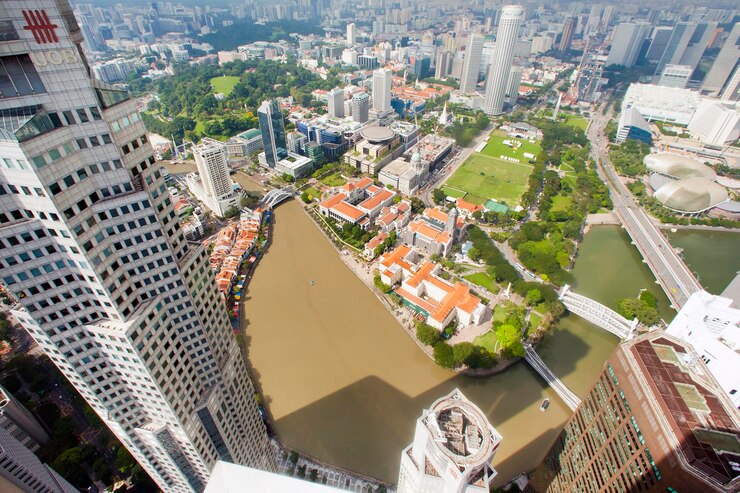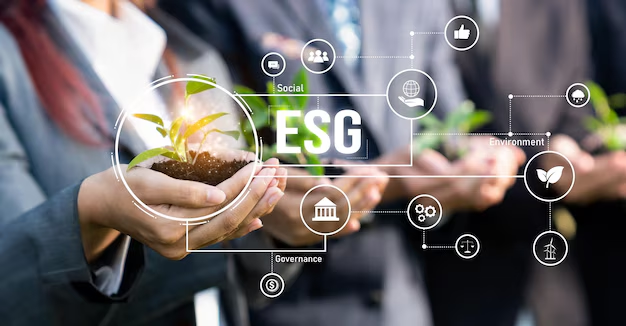Singapore’s Mandatory Climate Disclosures Expand in 2025
Are You Ready?

As the global push for sustainability intensifies, Singapore is stepping up as a trailblazer in Asia with its expanded mandatory climate disclosure requirements kicking off in 2025. Aligned with the International Sustainability Standards Board (ISSB) standards, these regulations mark a pivotal shift for listed companies and, soon, large non-listed firms, demanding transparency on climate-related risks and opportunities. At the World of Circular Economy (WOCE), we’re committed to helping businesses navigate this new landscape with tools like esgpro.ai. But what do these changes mean for your business, and are you ready to comply? Let’s dive into the details, risks, and strategies to thrive in this green transition.
The New Rules: What’s Changing in 2025?
Singapore’s mandatory climate disclosure framework, announced by Second Minister for Finance Chee Hong Tat on February 28, 2024, builds on the Task Force on Climate-related Financial Disclosures (TCFD) and adopts the ISSB’s IFRS S1 and S2 standards. Starting in financial year (FY) 2025, all listed companies on the Singapore Exchange (SGX) must report Scope 1 and Scope 2 greenhouse gas (GHG) emissions, covering direct emissions from owned sources and indirect emissions from purchased energy. By FY2026, these companies will also need to disclose Scope 3 emissions, which include indirect emissions across the value chain, like supply chains and business travel. Large non-listed companies (with annual revenue ≥ S$1 billion and assets ≥ S$500 million) will follow suit from FY2027 for Scope 1 and 2, with Scope 3 reporting tentatively starting in FY2029.
These disclosures go beyond emissions numbers. Companies must detail:
1. Climate Risks and Opportunities: How climate change impacts business operations and strategies to mitigate risks or capitalize on green opportunities.
2. Governance Structures: Board oversight and management processes for climate-related issues.
3. Strategy Integration: How climate considerations shape business planning and financial performance.
External assurance on Scope 1 and 2 emissions will be required for listed companies from FY2027 and non-listed companies from FY2029, ensuring data credibility. A transitional exemption applies for non-listed firms whose parent companies report under ISSB-aligned or equivalent standards (e.g., EU’s CSRD) from FY2027 to FY2029, subject to conditions like public availability of reports.
Why It Matters: The Stakes Are High

Singapore’s move isn’t just regulatory, it’s a strategic push to align with the nation’s Green Plan 2030 and net-zero by 2050 goals. With ESG assets projected to hit $53 trillion globally by 2025, according to Bloomberg Intelligence, transparent climate reporting is a ticket to accessing green capital, new markets, and consumer trust. Companies that nail this can attract investors, boost brand reputation, and tap into sustainable finance opportunities. Conversely, non-compliance risks legal penalties, reputational damage, and lost competitiveness. A 2023 EY-CPA Australia study found only 28% of SGX-listed companies were fully TCFD-ready, highlighting a readiness gap that could widen with stricter rules.
Greenhushing, when companies underreport sustainability efforts to avoid scrutiny, poses another risk. Silence can erode stakeholder trust, with 86% of UK consumers demanding transparency, a sentiment echoed globally. Singapore’s regulations aim to curb this by mandating clear, verifiable disclosures, pushing businesses to communicate boldly or face skepticism.
The Challenges: Are You Prepared?
Compliance isn’t a walk in the park. The Singapore Business Federation (SBF) reported that only 4% of surveyed companies feel ready for the 2025 deadline, citing challenges like:
1. Data Complexity: Collecting accurate Scope 1, 2, and especially Scope 3 emissions data across global supply chains is daunting.
2. Resource Constraints: Smaller firms lack the expertise, systems, or budget to comply, with corporate issuers spending over $675,000 annually on climate reporting, per the SustainAbility Institute.
3. Skill Gaps: Only 10% of SGX-listed companies sought external assurance in 2023, indicating a need for specialized training.
4. Regulatory Evolution: Keeping up with ISSB standards and potential Scope 3 extensions for non-listed firms requires constant monitoring.
These hurdles are real, but they’re also opportunities to build resilience and stand out in a competitive market.
WOCE’s Role: Simplifying Compliance with esgpro.ai
At WOCE, we’re not just watching this transition, we’re empowering businesses to lead it. Our esgpro.ai platform is designed to tackle the complexities of mandatory climate disclosures head-on. Here’s how:
1. Automated ESG Data Management: esgpro.ai streamlines data collection for Scope 1, 2, and 3 emissions, reducing manual errors and ensuring compliance.
2. Carbon Offset Marketplace: Purchase verified carbon credits to offset emissions, aligning with Singapore’s net-zero goals.
3. Transparent Reporting: Generate clear, auditable reports that meet regulatory standards and boost stakeholder confidence.
4. Real-Time Insights: Monitor risks and opportunities with AI-driven analytics, helping you stay ahead of evolving regulations.
Strategies to Get Ready

To thrive under Singapore’s new rules, businesses need a proactive game plan. Here are five steps to prepare
1. Assess Your Baseline: Map your Scope 1 and 2 emissions now, and start estimating Scope 3. Tools like esgpro.ai can automate this process.
2. Build Internal Capacity: Train your sustainability, finance, and risk teams to align data collection with ISSB standards. Engage external consultants if needed.
3. Leverage Technology: Adopt ESG software to automate data collection and reporting. Singapore’s government offers funding (up to 30% for large firms) to offset initial costs.
4. Engage Stakeholders: Collaborate with suppliers and partners to gather accurate value chain data, especially for Scope 3.
5. Communicate Transparently: Avoid greenhushing by sharing clear, verifiable progress.
The Bigger Picture: A Regional Ripple Effect
Singapore’s leadership could spark a “Merlion Effect,” influencing ASEAN neighbors like Malaysia and Thailand, which are adopting similar ESG frameworks. As the first Asian nation to mandate climate disclosures for non-listed companies, Singapore sets a precedent for regional sustainability. Businesses that align early will not only comply but also gain a competitive edge in global markets.
The Road Ahead
The 2025 rollout is just the start. With Scope 3 reporting and external assurance looming, the pressure to act is now. Non-compliance risks fines, investor backlash, and missed opportunities in the $1.4 trillion sustainable finance market. But those who embrace these rules, like the 65% of SGX-listed firms already reporting in 2022, stand to gain trust, capital, and resilience.
At WOCE, we’re here to make compliance seamless and impactful. Our AI-powered esgpro.ai platform empowers businesses to track, offset, and report with ease, turning regulatory challenges into strategic wins. Singapore’s mandatory climate disclosures are a call to action, don’t just meet the standard, exceed it.




